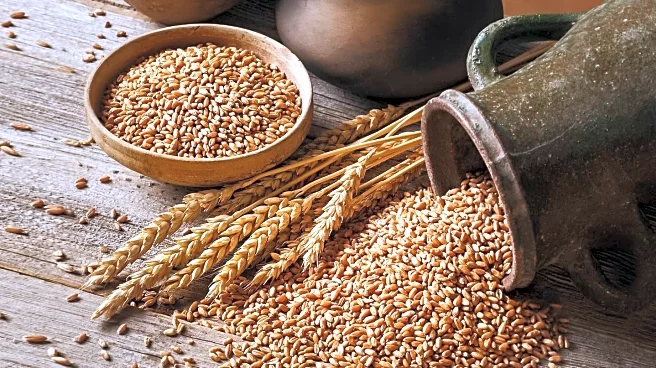What's Happening?
Registered associate nutritionist Eli Brecher has emphasized the importance of grains as nutritional powerhouses, detailing their benefits and recommending specific types for optimal health. Grains, defined as the edible seeds of grasses like wheat, oats, rice, corn, and barley, consist of three parts: the bran, germ, and endosperm. Whole grains retain all these parts, offering a full package of fiber, B vitamins, antioxidants, and minerals. Brecher notes that whole grains are crucial for dietary fiber, which supports gut health, immunity, mood, and hormone balance. She identifies oats, quinoa, brown rice, barley, buckwheat, millet, farro, and rye as particularly beneficial grains, each offering unique health advantages such as improved digestion, heart health, and energy metabolism.
Why It's Important?
The emphasis on whole grains is significant due to their role in reducing the risk of chronic diseases like type 2 diabetes, cardiovascular disease, and certain cancers. Whole grains provide essential nutrients that many people lack, such as fiber, B vitamins, and minerals like magnesium and iron. By incorporating these grains into daily meals, individuals can improve their overall health, manage weight, and enhance gut microbiome diversity. The focus on grains also highlights the importance of dietary choices in maintaining long-term health and preventing lifestyle-related diseases.
What's Next?
Brecher suggests practical ways to incorporate grains into meals, such as using oats for breakfast, quinoa or buckwheat in salads for lunch, and brown rice or barley for dinner. She advises combining grains with protein and healthy fats to maximize their benefits. This approach not only supports sustainable weight management but also improves gut diversity. As awareness of the health benefits of grains grows, more people may adopt these dietary practices, potentially leading to broader public health improvements.
Beyond the Headlines
The discussion on grains also touches on the broader implications of dietary habits and their impact on health. The focus on whole grains underscores the need for a balanced diet that includes a variety of nutrients to support overall well-being. This perspective aligns with growing trends in nutrition that prioritize whole foods and plant-based diets for their health benefits and environmental sustainability.









